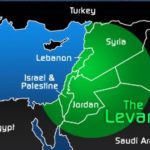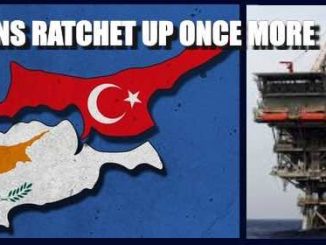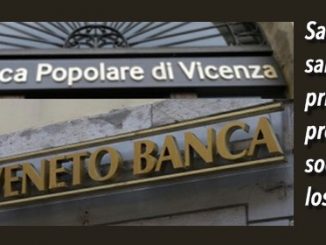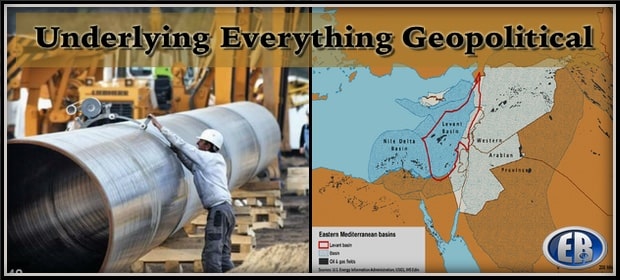
Natural gas
GEFIRA
In the eastern Mediterranean, it smells of powder. Fighter jets from various countries fly over the Levantine Basin and frigates are on a collision course. These are not exercises. It is a crisis reminiscent of the conflict between Ankara and Athens in the 1970s or even the beginning of the First World War. This time it is not just about the ambitions of Greece or Turkey, small islands or a dead prince, but about the struggle for energy. In the Levantine Basin, ever larger deposits of natural gas are being discovered and there are many who would like a piece of the cake.
Back in 2010, the American company Noble Energy and its Israeli exploration partner Derrick Drilling discovered the largest gas field only 130 km from Haifa. A year later, French Total confirmed another deposit with a volume of 127 billion m3. The researchers suspect a total of 3.5 trillion cubic metres of natural gas and 1.7 billion barrels of crude oil deep in the rock beneath the seabed. How much is that actually? Certainly enough to fill the coffers of the states bordering the Mediterranean and make a solid contribution to Western Europe’s energy supply. By way of comparison, the total natural gas consumption in the European Union in 2019 was around 470 billion cubic metres.
No wonder, then, that the areas between Cyprus, Turkey, the Greek islands, Syria, Lebanon, Israel, Egypt and Libya became the scene of a conflict that could well turn into a war. It would not be a local war because the conflict and possible gains also involve other actors whose interests could be disrupted by the gas from the eastern Mediterranean, even though their geopolitical interests appear to lie elsewhere.
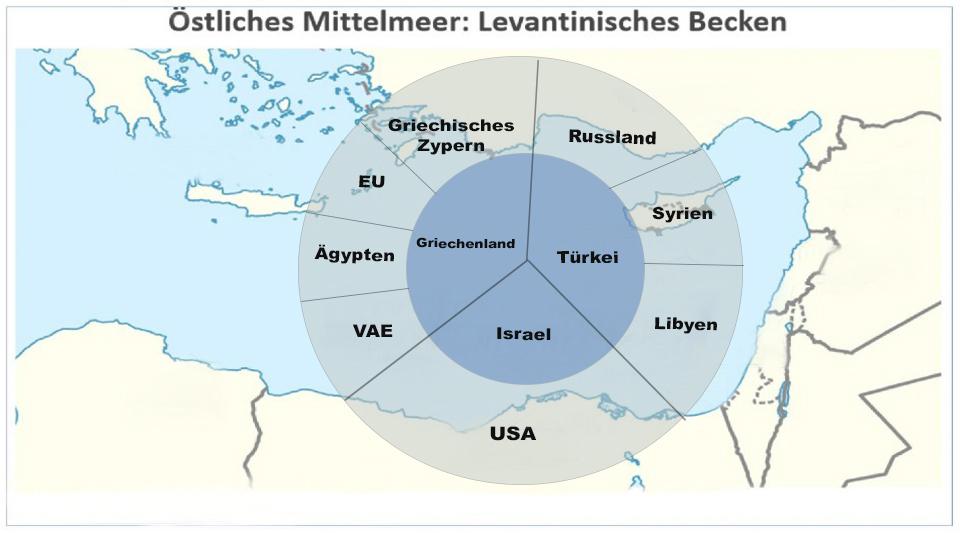
The natural gas alliances in the Eastern Mediterranean, or who with whom against whom?
It is worth noting that the discovery of the large gas reserves in the Mediterranean overlapped with the Arab Spring, which paralysed many projects supplying Europe with energy from North Africa, such as Desertec, a project in the Sahara to produce electricity from photovoltaic energy and transport it to Europe via high-voltage, direct current transmission networks. Natural gas from the Levantine Basin could also be transported cost-effectively along the north coast of Africa via pipeline to Spain, boosting the economies of Libya, Algeria, Tunisia and Morocco and diversifying energy supplies to Western Europe. Now someone probably did not want that and provoked the Arab Spring. So an alternative idea was put forward: to have a pipeline built on the bottom of the Mediterranean Sea.
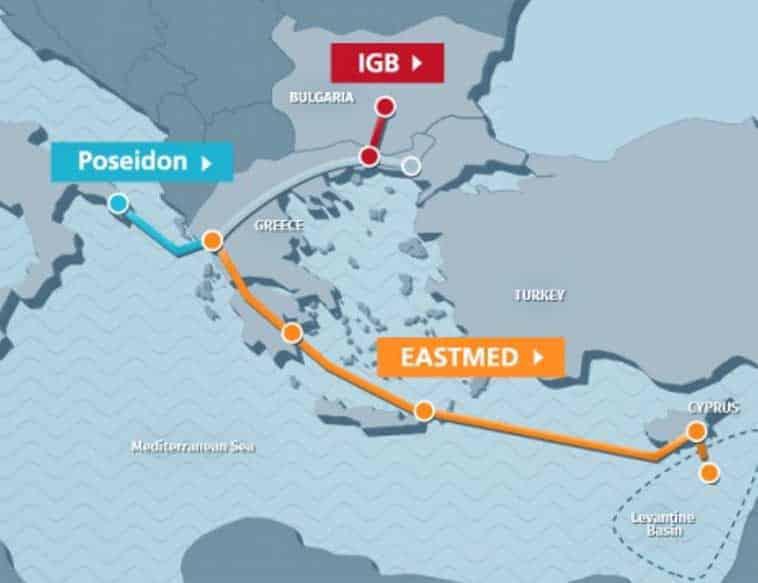
The Eastmed project, however, had been put on hold in Brussels for years. The main reason for this were allegedly technical difficulties. The 1,900 km long pipeline would pass through earthquake-prone areas in some places at a depth of 3 km. In fact, until Crimea was united to Russia and the hybrid war in Ukraine began, the EU relied on Russian gas while the countries of Southern Europe were to be supplied via South Stream. However, after the Crimean crisis, the EU and Senator McCain blocked the construction of the pipeline in Bulgaria.

Variants of the South Stream
Eastmed, together with TANAP and TAP – Transanatolian and Trans-Adriatic Pipelines – designed to bring gas from Azerbaijan via Turkey to the EU – became the only alternative to Nord Stream.

So it is clear why Turkey wants to grab the natural gas reserves in the Eastern Mediterranean. Together with Russia, it could control Europe’s supply. And the construction of Nord Stream 2 is in this context also a clear Russian response to Eastmed.
In 2019, the Italian Eni and the French Total discovered further natural gas reserves in the Levantine Basin. Turkish Cypriots, claiming these deposits to be theirs, were outraged by their exploration activities. Erdoğan sent its warships to make further work impossible for the French and Italians. Later, when Greece, Cyprus and Israel signed an agreement on the construction of the pipeline, the Turkish President signed a maritime border agreement with Libya in return, saying:
“No research vessels may work or drill in this maritime zone without the permission of both states. This is no longer possible under international law.”
He thus blocked the construction of the pipeline. Greece and the EU were outsmarted. To that extent, Erdoğan’s policy of blocking the construction of Eastmed, which Israel could also join, played into the hands of the Russians, even if Turkey’s military involvement in Libya on the side of the government there is a provocation to Putin, whose soldiers support General Haftar, who is fighting against Tripoli.
For Erdoğan, one event was the last drop in the ocean that broke the camel’s back: in August this year, Greece signed an agreement with Egypt similar to the one he signed with Libya, thus creating another exclusive economic zone. Ankara then sent its research vessel “Oruc Reis” to search for natural gas in the area agreed with Tripoli. Since, according to Athens, this area is part of its territorial waters, it sent its navy there.

The conflict was escalated. In addition to Macron’s frigate “Lafayette” and his fighter jets, which take off from Crete, the United Arab Emirates, which has a bone to pick with Turkey over the Muslim Brotherhood, has also flown its aircraft, joining the coalition against Erdoğan. Turkey supports the Muslim Brotherhood, while Egypt, the UAE and Saudi Arabia consider them a threat. The struggle over the form of Islam is thus projected into the gas conflict in the Mediterranean. If it escalates, Sunni countries with their various interests may also intervene militarily. Not to forget that Qatar, which is considered the largest sponsor of the Muslim Brotherhood, would fight on Turkey’s side. Since Hamas is an offshoot of the Muslim Brotherhood, the Turkish president could use the conflict to unite an important part of the Arab world under the flag of the new sultan from Ankara.
 Just as the UAE allegedly has no business in the Mediterranean, the Navalny case seems to have nothing to do with the gas conflict. Note, however, that his poisoning was used to play into the hands of Americans: to criticise and block the Nordstream 2 construction even more strongly in Germany. After all, Washington is interested in selling its expensive LNG gas to the Europeans. So, was his poisoning a smoke screen by the American or Turkish secret services, or the two together?
Just as the UAE allegedly has no business in the Mediterranean, the Navalny case seems to have nothing to do with the gas conflict. Note, however, that his poisoning was used to play into the hands of Americans: to criticise and block the Nordstream 2 construction even more strongly in Germany. After all, Washington is interested in selling its expensive LNG gas to the Europeans. So, was his poisoning a smoke screen by the American or Turkish secret services, or the two together?
One thing is certain. Natural gas is totally important for Europe and the conflict in the eastern Mediterranean will influence the whole geopolitics.
************
Original article

••••
The Liberty Beacon Project is now expanding at a near exponential rate, and for this we are grateful and excited! But we must also be practical. For 7 years we have not asked for any donations, and have built this project with our own funds as we grew. We are now experiencing ever increasing growing pains due to the large number of websites and projects we represent. So we have just installed donation buttons on our websites and ask that you consider this when you visit them. Nothing is too small. We thank you for all your support and your considerations … (TLB)
••••
Comment Policy: As a privately owned web site, we reserve the right to remove comments that contain spam, advertising, vulgarity, threats of violence, racism, or personal/abusive attacks on other users. This also applies to trolling, the use of more than one alias, or just intentional mischief. Enforcement of this policy is at the discretion of this websites administrators. Repeat offenders may be blocked or permanently banned without prior warning.
••••
Disclaimer: TLB websites contain copyrighted material the use of which has not always been specifically authorized by the copyright owner. We are making such material available to our readers under the provisions of “fair use” in an effort to advance a better understanding of political, health, economic and social issues. The material on this site is distributed without profit to those who have expressed a prior interest in receiving it for research and educational purposes. If you wish to use copyrighted material for purposes other than “fair use” you must request permission from the copyright owner.
••••
Disclaimer: The information and opinions shared are for informational purposes only including, but not limited to, text, graphics, images and other material are not intended as medical advice or instruction. Nothing mentioned is intended to be a substitute for professional medical advice, diagnosis or treatment.


